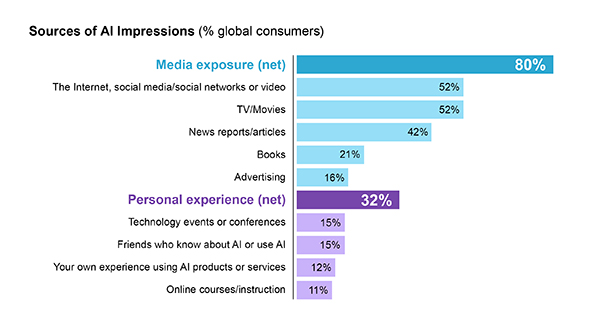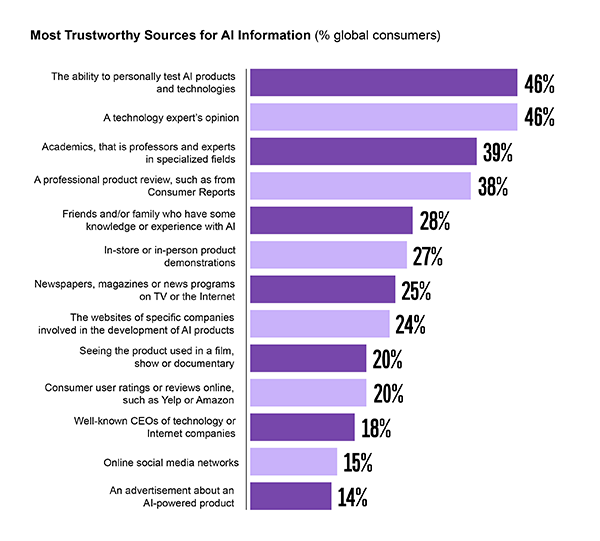Global Consumers are Seven Times More Likely to See a Positive than Negative Impact of Artificial Intelligence (AI) on Society and Their Personal Lives
According to a new survey released today by global communications and engagement firm Weber Shandwick, consumers around the globe are more likely to see artificial intelligence’s (AI) impact on society as positive than negative (45 vs. 7 percent, respectively). When it comes to their personal lives, consumers are even more likely to think it will have a positive than negative impact (52 percent vs. 7 percent, respectively). AI-Ready or Not: Artificial Intelligence Here We Come! was conducted with KRC Research among consumers in five global markets and supplemented with interviews with CMOs, those responsible for marketing and branding in their organizations.

– 68 Percent of CMOs Report Their Company is Doing or Planning for Business in the AI Era
– 55 Percent of CMOs Expect AI to Have a Greater Impact on Marketing and Communications than Social Media Ever Had –
According to a new survey released today by global communications and engagement firm Weber Shandwick, consumers around the globe are more likely to see artificial intelligence’s (AI) impact on society as positive than negative (45 vs. 7 percent, respectively). When it comes to their personal lives, consumers are even more likely to think it will have a positive than negative impact (52 percent vs. 7 percent, respectively). AI-Ready or Not: Artificial Intelligence Here We Come! was conducted with KRC Research among consumers in five global markets and supplemented with interviews with CMOs, those responsible for marketing and branding in their organizations.
“Superficial intelligence” best describes consumers’ understanding of AI. While two-thirds (66 percent) of those surveyed say that they know a lot (18 percent) or a little (48 percent) about AI, one-third (34 percent) admit knowing nothing. The most common word association with AI is “robots,” as mentioned by 22 percent of consumers unprompted.
The Business of AI
AI is rapidly transforming business and marketing processes. Nearly seven in 10 CMOs in our study (68 percent) report that their company is currently selling, using or planning for business in the AI era, and nearly six in 10 (58 percent) believe that within the next five years, companies will need to compete in the AI space to succeed. As for their own roles, 55 percent of CMOs expect AI to have a greater impact on marketing and communications than social media ever had. This is a remarkable statement coming from a profession turned upside down by social media in the past 10 years.
AI-Ready
Only eight percent of global consumers think AI is science fiction and will never materialize. Most (92 percent) expect AI to arrive eventually – 40 percent think AI is close to or fully developed now and 52 percent think it is only in its earliest stages of development. In fact, most consumers seem ready for AI to be a reality. After hearing the potential benefits and concerns associated with AI, one-quarter (26 percent) would like the development of AI accelerated. Half (51 percent) would like development to remain at its current pace. Only 23 percent would like it to slow down or stop altogether. Based upon their perceptions today, consumers seem ready for AI to be a reality.
AI Sidekicks
What would consumers trust AI to do? Two-thirds or more trust AI with handling medication reminders, travel directions, entertainment, targeted news, and manual labor and mechanics. AI is trusted by 50 percent or more to provide elder care, health advice, financial guidance and social media content creation. And, 40 percent or more trust AI to provide legal advice, cook, teach, police and drive. Not surprisingly, they do not see AI as having the ability to help erase social inequities.
Media as Explainer-in-Chief
When asked where their overall impression of AI comes from, 80 percent of global consumers mention some form of media, a mix primarily of Internet, social media, TV, movies and the news. Media exposure trumps personal experience as an information.

In fact, over half of global consumers (59 percent) said they had seen or read something in the media within the past 30 days about AI or had some personal experience with it. The vast majority of these consumers (82 percent) report that what they had seen, heard, or experienced was positive.
Trust in AI Comes Down to Experience and Expertise
When it comes to accurate sources of information about AI, global consumers report that the most credible information will come from hands-on experience (46 percent) and technology experts (46 percent). Consumers also say they trust academics and experts in specialized fields (39 percent) and professional product reviews (38 percent). Respondents in our study gave less weight to friends, family and other personal relationships (28 percent).

AI Adoption Meets Trepidation
Despite fairly positive perceptions of the impact of AI on their lives personally and on society, nearly two-thirds of global consumers (64 percent) register concern about the use or adoption of AI, although mostly at a moderate level (49 percent). When consumers were given a list of potential downsides to AI, criminal behavior and cyber attacks rise to the top as critical concerns along with job losses. The research also unearthed a deep vein of concern over loss of privacy and government interference with personal information.
When asked directly about potential job losses, the vast majority (82 percent) of consumers in all markets expect job loss due to AI. Only 18 percent expect AI to create new jobs.
AI Vanguard to the Rescue
The research identified a small but highly AI-conversant segment of global consumers (18 percent). These pioneers pave the way for product success or failure. Who are they? Relative to the average consumer, this AI Vanguard skews younger, male, educated, employed, higher income and urban.
These early adopters gravitate to entertainment about AI, notice AI advertising and trust their social networks for AI information. They are more optimistic about the impact of AI on society and themselves. Like the average consumer, the AI Vanguard also has a strong perceptual connection between AI and robots and registers the same concerns about the potential dangers of AI, specifically criminality and job loss. Since the survey found that those who know more about AI are more positive about its societal and personal impact, cultivating the AI Vanguard can help spread good word about the new technology.
Regional Differences
The five regions covered by our consumer survey have some unique characteristics. Below are highlights. Our full report includes more detail.
- Chinese consumers report having the strongest knowledge of AI and UK consumers report the weakest (31 percent vs. 10 percent, respectively, say they know a lot about AI).
- In Canada, the ability to personally test AI products far surpasses other sources as a trusted means of learning about AI (63 percent vs. professional product reviews, the second highest rated source, at 49 percent).
- U.S. consumers rank providing entertainment and medication reminders at the top of their list of AI’s most trusted tasks (73 percent for both).
- A moderate number of Brazilian consumers (61 percent) say AI’s impact on society will be positive, though they report the greatest concern about AI adoption (79 percent). The loss of certain abilities or skills is unique to Canadians’ biggest concerns (98 percent) and people becoming lazy and getting hurt in accidents are unique to Brazilians’ top concerns (93 percent each).
- UK consumers are the most likely to agree that AI will lead to job loss (91 percent), yet they are the least likely to think AI could replace their own job even partially (47 percent). Perhaps this paradox exists due to their high perception that AI is currently science fiction (21 percent).
Guiding Principles for AI Adoption and Integration
“For companies to successfully compete in the new age of artificial intelligence, CMOs will be central to bringing consumers up the AI learning curve while at the same time selling in their products and services,” said Patrick Chaupham, Executive Vice President, Creative Technology Strategy, Weber Shandwick. “Consumers may seem ready for AI, but they have concerns, and therefore an artful balancing act of education and promotion will be the CMO’s greatest challenge. Marketers will need to creatively engage consumer segments on understanding AI benefits.”
Weber Shandwick’s report provides 10 guidelines for marketing and communications professionals and their companies to consider when introducing AI into the marketplace and mainstream. Six are listed below. Please see the full report for the full list of guidelines and an explanation of each.
- Broaden baseline understanding.
- Strengthen media relationships.
- Find your experts.
- Ignore AI fears at your own risk.
- Consumer knowledge is the key to success.
- Consider responsible AI practices for your industry.
Click here to view the full report.
About the Research
AI-Ready or Not was commissioned by Weber Shandwick and conducted by KRC Research in June 2016. We surveyed two segments. First, we surveyed 2,100 adult consumers online in the U.S., Canada, UK, China, and Brazil, representing the general population of each market. Second, we surveyed 150 executives by telephone in the U.S., UK and China responsible for the oversight and execution of marketing or branding activities at their organizations. All CMOs were employed by companies with annual revenues of at least $500 million USD or comparable levels in other markets.
About Weber Shandwick
Weber Shandwick is a leading global communications and engagement firm in 79 cities across 34 countries with a network extending to 127 cities in 81 countries. The firm’s diverse team of strategists, analysts, producers, designers, developers and campaign activators has won the most prestigious awards in the world for innovative, creative approaches and impactful work, including being honored as PRWeek’s Global Agency of the Year in 2015 and 2016, an Ad Age A-List Agency in 2014 and 2015, and The Holmes Report’s Global Agency of the Year in 2010, 2012, 2014 and 2015. Weber Shandwick and its Prime unit have won a combined 31 Cannes Lions since 2009 and are credited as PR agency on an additional 25 Lions. Weber Shandwick was also named a Best Place to Work by Ad Age in 2014 and 2015 and PRWeek in 2013 and 2014. The firm deploys deep expertise across sectors and specialty areas, including consumer marketing, corporate reputation, healthcare, technology, public affairs, financial services, corporate social responsibility, financial communications and crisis management, using proprietary social, digital and analytics methodologies. Weber Shandwick is part of the Interpublic Group (NYSE: IPG). For more information, visit https://www.webershandwick.com/.
About KRC Research
KRC Research is a global full-service nonpartisan opinion research and strategy firm. A unit of the Interpublic Group of Companies (NYSE: IPG), KRC Research offers the quality and custom service of a small firm with the reach of a global organization. For over 30 years, KRC Research has worked on behalf of corporations, governments, not-for-profits and the communications firms that represent them. Staffed with multidisciplinary research professionals, KRC combines sophisticated research tools with real-world communications experience. For more information, visit www.krcresearch.com